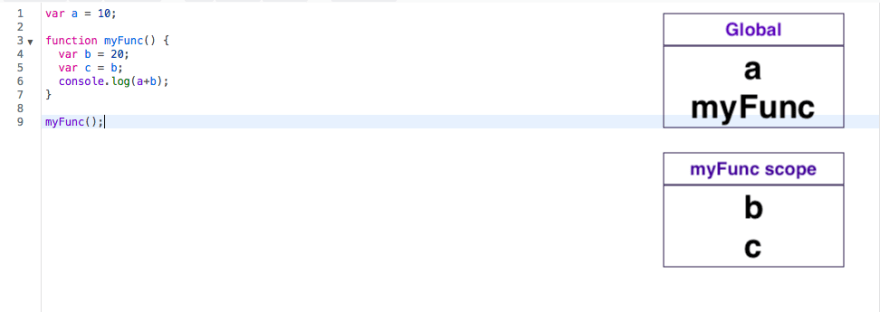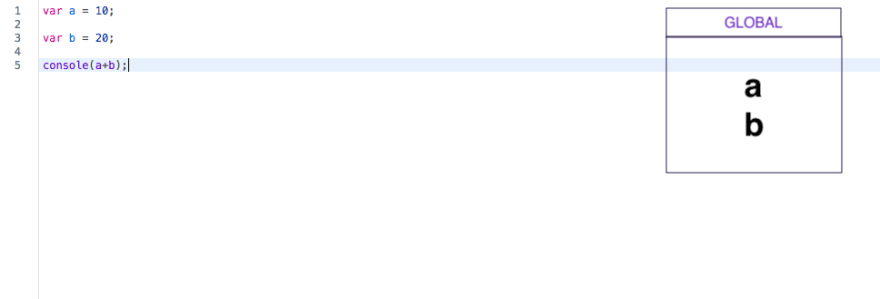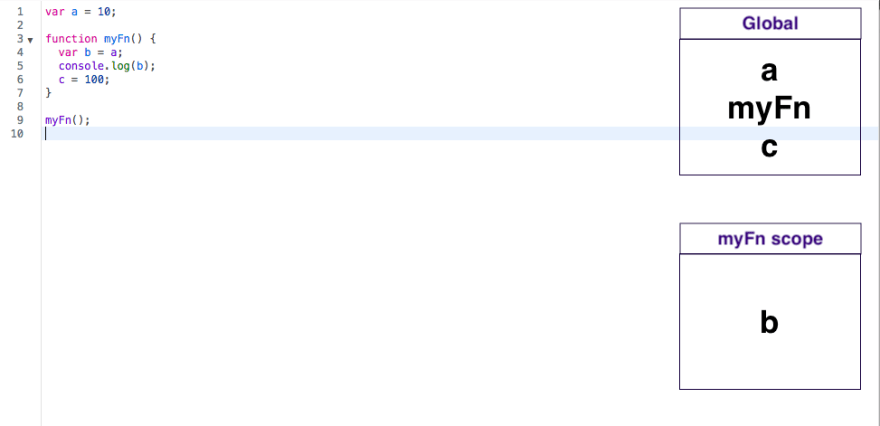Welcome to part3 of the series.
The traditional languages like Java and C++ are compiled languages, means you have to make an intermediate executable from your source code. In java you make a “jar file” and in C++ you make an “out file”.
In javascript you directly execute your source code. A webpage will directly execute your javascript. So, for that reason many people think Javascript as a interpreted language.
However their is a compilation step just before the interpretation step in Javascript. So, JS is both interpreted and compiled language.
Compilation step — During this step the compiler mainly registers the variable declarations.
Let consider the below example. The compilation steps mainly looks at the var keyword. It is not bothered with what is assigned in these variables.
When the compiler goes to line 1, it encounters var a and registers it in the global scope and then goes to line 3 and registers the var b. Line 5 is only a console and it doesn’t finds any var, so don’t do anything.
Let consider another example. Here the compiler finds 4 variable declarations.
 Another compilation step example
Another compilation step example
It is obvious that var a, b and c are variable declaration. But myFunc at line 3 is also a variable declaration because functions in JS are actually object declarations.
Let do another one. In this variable declaration at line 1 and line 3 in global scope are obvious. But there is another variable declaration at line 3 for name=myName, which is in greet scope.
 Yet another compilation step example
Yet another compilation step example
Interpretation step- This step is followed by the compilation step and in it the actual execution takes place.
Let consider the above example only. Once the compilation step is complete, the interpretation steps starts.
Now the interpretor starts at line 1 and see a variable myName and ask the compiler, if it have a variable myName in Global scope and the compiler have it. So, it assigns the value Nabendu to it.
At line 3 no assignment/execution needs to be done, so it goes to line 7 and here there is function greet which it finds from the compiler at the Global scope. Even the myName variable inside it is in Global scope.
Now with this the line 3 is executed and here it finds another variable name. The variable name it finds from the compiler from the greet scope.
Now once the interpretor goes inside the function and at line 4, it finds console. It first looks for console at greet scope and then at global scope from the compiler but don’t find it. So, it checks in the Javascript global and finds it. Inside the console there is name, which it finds at greet scope.
Let consider an example how the interpretor can lead to creation of global variable.
Here the compiler have a successful run but when the interpretor comes to line 6, it checks the value of c first at the myFn scope and then at the global scope. But it cannot find it so it throws a runtime error.
Let change the line 6 to a write operation and see what happen. As we know write operations on undeclared variables don’t throws an error and the interpretor creates it.
Now in above the compiler ignore line 6 as there is no variable declaration with var. So, when the interpretor comes to line 6 and ask the compiler for variable c, it doesn’t gets it in myFn or the global scope.
Since, write operations don’t throw an error in JS. The interpretor creates the same in the global scope.










Top comments (0)